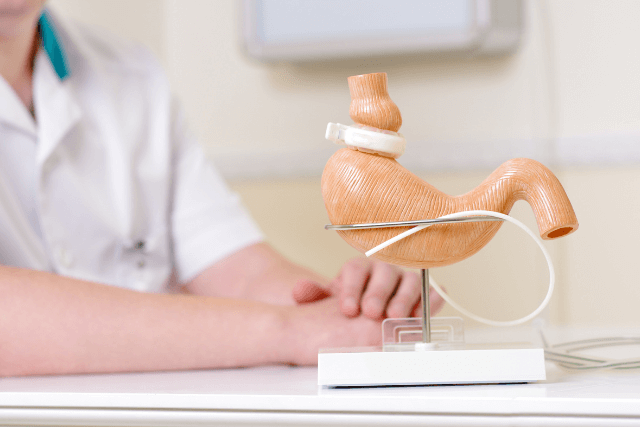Bariatric surgery is a life-changing procedure that helps individuals struggling with obesity to lose weight and improve their overall health. The surgery can be highly effective, but many people wonder, “Can I regain weight after bariatric surgery?” It’s a valid concern. While bariatric surgery can jump-start weight loss, it’s essential to understand that maintaining weight loss requires ongoing effort and commitment. In this blog, we’ll explore the factors that affect weight loss after surgery, how to avoid weight regain, and what steps you can take to maintain your new weight in the long term.
Can I Regain Weight
Can I regain weight after bariatric surgery is a question that many patients have during their weight loss journey. The answer is yes, weight regain is possible, but it isn’t inevitable. Bariatric surgery, such as gastric bypass, sleeve gastrectomy, or gastric banding, works by altering the digestive system to limit food intake or absorption. However, weight regain can occur if lifestyle changes aren’t followed post-surgery. Understanding the contributing factors can help you avoid this setback.
1. Why Weight Regain Happens
Weight regain after bariatric surgery is possible for a variety of reasons. Weight regain after surgery occurs when the weight loss that was achieved through the surgery is gradually reversed. The reasons for this can be broken down into several key factors, including:
- Dietary Choices: After surgery, you are required to follow a strict diet and portion control. Over time, people may start to revert to old eating habits or consume high-calorie foods. This can cause a gradual increase in weight.
- Lack of Physical Activity: Exercise plays a crucial role in maintaining weight loss. If physical activity decreases over time, it becomes easier to gain weight back.
- Psychological Factors: Many individuals undergo emotional eating as a coping mechanism. Even after surgery, if emotional triggers are not addressed, old patterns can resurface, leading to weight regain.
- Surgical Changes Over Time: The physical changes caused by bariatric surgery may change over time. For example, the stomach can stretch slightly, which might allow for the intake of larger portions of food.
Addressing these factors early on can help prevent weight regain and ensure long-term success after bariatric surgery.
2. Factors That Influence Weight Loss and Regain
There are several factors that can influence whether you can maintain weight loss or regain weight after bariatric surgery. Understanding these factors will help you make better choices moving forward. Some key factors include:
- Adherence to Post-Op Guidelines: After bariatric surgery, it’s important to follow dietary guidelines, attend follow-up appointments, and avoid high-calorie, nutrient-poor foods. Individuals who do not follow post-surgery instructions are at a higher risk of weight regain.
- Age and Metabolism: Your age and metabolic rate play a role in how easily you can lose and maintain weight. Younger individuals with higher metabolism rates may find it easier to keep the weight off compared to older individuals.
- Type of Bariatric Surgery: Different types of bariatric surgery have different long-term success rates. For instance, gastric bypass tends to have higher long-term weight loss maintenance rates compared to gastric banding.
By staying consistent with the required changes and understanding the impact of these factors, you can minimize the chances of regaining weight after surgery.
3. The Importance of Post-Surgery Diet
A major contributor to weight regain after surgery is the inability to maintain a proper diet. Bariatric surgery restricts how much you can eat and changes the way your body processes food. It’s crucial to understand the importance of a healthy post-surgery diet to avoid regaining weight. A healthy, balanced diet that includes protein-rich foods, low-carb options, and lots of vegetables is key to sustaining weight loss.
Post-surgery, your stomach will be smaller, so it’s essential to:
- Focus on protein-rich foods to maintain muscle mass and prevent hunger.
- Avoid sugar and refined carbs, as they can lead to rapid weight gain and poor health.
- Control portion sizes to ensure you’re not overeating.
4. Exercise and Physical Activity: Key to Maintaining Weight Loss
Regular physical activity is crucial for long-term weight management after bariatric surgery. If you are concerned about regaining weight, exercise is one of the most effective ways to prevent it. Exercise after bariatric surgery helps to:
- Increase your metabolism and burn calories
- Improve muscle tone and body composition
- Regulate appetite and reduce emotional eating
Incorporating regular exercise into your routine, such as walking, strength training, and cardio, will not only help you maintain your weight but also improve your overall health and well-being. Aim for at least 150 minutes of moderate aerobic activity per week, along with strength training exercises two to three times per week.
5. Emotional Eating and Its Role in Weight Regain
Even after bariatric surgery, some individuals may struggle with emotional eating. Emotional eating is the tendency to eat in response to feelings like stress, boredom, or sadness, rather than actual hunger. Bariatric surgery doesn’t address emotional eating directly, which is why it can be a significant factor in weight regain.
If you continue to use food to cope with your emotions, it’s easy to fall back into old habits. This is where mental and emotional support plays a significant role. Counseling, support groups, and therapy can be valuable tools in helping you manage emotional eating and maintain your weight loss.
6. Stretching of the Stomach and Its Impact on Weight Loss
Over time, it’s possible for the stomach pouch created by bariatric surgery to stretch. This can make it easier for people to consume larger portions of food, which may lead to regaining weight. However, it’s important to note that this is usually a gradual process.
To prevent this from happening, it’s essential to continue following a healthy diet and portion control. Regular check-ups with your healthcare provider can also ensure that your stomach is functioning properly and that you are adhering to the necessary dietary restrictions.
7. Long-Term Commitment to a Healthy Lifestyle
Ultimately, the key to avoiding regaining weight after bariatric surgery is adopting a long-term commitment to a healthy lifestyle. Bariatric surgery is only one part of the journey; the real work comes afterward. The most successful patients are those who:
- Stay consistent with their post-surgery diet
- Incorporate regular physical activity
- Seek emotional support when necessary
- Make mindful, sustainable lifestyle changes
- Join a support group to stay motivated and share experiences with others on the same journey
Maintaining weight loss after bariatric surgery requires effort, discipline, and commitment. The road may not always be smooth, but making healthy choices every day will help you maintain the weight loss you’ve worked so hard for.
Conclusion: Can I Regain Weight After Bariatric Surgery?
Can I regain weight after bariatric surgery? Yes, it is possible. However, it’s important to recognize that weight regain is not inevitable. By adhering to a balanced diet, staying active, addressing emotional eating, and maintaining regular medical check-ups, you can minimize the risk of regaining weight. Bariatric surgery is just the beginning of your journey toward a healthier lifestyle. Your long-term success will depend on your commitment to making lasting changes. If you remain dedicated to maintaining healthy habits, you can keep the weight off and enjoy the benefits of improved health and quality of life.
Final Takeaway: Focus on Healthy Choices
Bariatric surgery can be the first step in a transformative journey. But regaining weight can happen if old habits creep back in. The key to long-term success is making consistent, healthy lifestyle choices. Maintain a balanced diet, engage in regular physical activity, and seek support when needed. In doing so, you can enjoy lasting weight loss and improved overall health.



